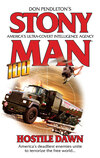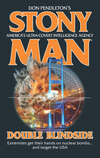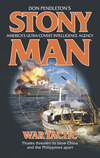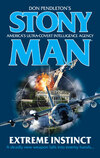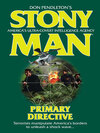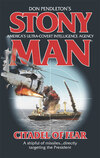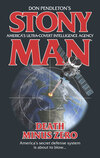Kitabı oku: «Hostile Dawn», sayfa 4
CHAPTER SEVEN
Washington, D.C.
Secretary of State Roland Carruthers frowned with annoyance as he read over the NSA briefing he’d just received regarding the escape of Kouri Ahmet. He wasn’t sure which infuriated him more, the fact that Ahmet was back on the loose or the circumstances that had allowed him to take control of the government jet bringing him to Los Angeles. He decided the latter was something he could more readily deal with, and within thirty seconds he was on the phone with FBI Director Eric Thompson, a longtime acquaintance and frequent golfing partner. Carruthers, a decorated Gulf War vet who’d parlayed his combat honors into a long-running political career, was never one to beat around the bush, and after a quick hello he got straight to the point.
“I don’t want to hear anything about rationales,” he told Thompson brusquely. “Whoever arranged Ahmet’s transfer needs to get the ax.”
“That’s not your call, Roland,” Thompson responded calmly. “You know that.”
“You got that right!” Carruthers snapped. “If it’d been my call, that two-bit son of a bitch would have had an unfortunate accident back in La Paz and never made it to the jet.”
“That might’ve made you sleep better at night, but it would have been a shortsighted solution,” Thompson countered. “We were looking at the big picture.”
“There are protocols, damn it!” Carruthers said. “Not to mention common sense. No backup security on the plane? One marshal and that was it? Hell, I’m surprised you didn’t offer the guy caviar and throw him a prostitute so he could join the Mile High Club!”
“I know you’re upset, Roland—”
“I’m at the top of that nut job’s hit list!” Carruthers said. “Upset doesn’t even come close!”
“Well, if it’s any consolation, we’ve already reassigned Cook,” Thompson said, referring to the FBI’s Regional Director for West Coast Operations. “If you want, I’ll take under consideration anyone you’d want as his replacement.”
“That’s it? Throw me a crumb and I’m all happy?”
“What else would you suggest?”
“How about Ahmet’s head on a platter?” Carruthers suggested. “That would work for me.”
“A silver platter, I suppose.”
“It can be a paper plate for all I care! Just drop-kick that bastard from here to kingdom come and be quick about it!”
“I’ll see what I can do,” Thompson offered. “Anything else?”
“What about that al Qaeda cell supposedly looking to raise hell in L.A.?” Carruthers said. “Anything new on that?”
“It looks like they got their hands on some explosives over the past couple days,” Thompson said. “We’re not sure of the quantity or what they plan to do with them, but we’re running a full court press. The president says he’s got some other input factored in, as well.”
“What kind of input?”
“He wouldn’t volunteer that,” Thompson said. “I didn’t press. You know how he likes to keep his tricks up his sleeve.”
“Don’t remind me,” Carruthers said, glancing up as one of his aides brought in the next round of paperwork requiring his attention. The secretary stared sourly at the piled documents, then waved the aide away and resumed tongue-lashing his longtime friend.
“Ahmet’s had dealings with al Qaeda,” Carruthers said. “Anybody put two and two together?”
“Yes, we’re considering that he’ll try to make contact with them,” said Thompson. “The Bureau’s part of the search effort, and if we’re finished here, maybe I can actually do my job and look into it a little further.”
“Good idea,” Carruthers said, easing back in his chair. His bluster spent, the secretary cracked his knuckles and detoured the conversation. “Just make sure you don’t miss our tee time at the club.”
Thompson laughed on the other end of the line. “I knew you had your priorities straight, Roland. I’ll see you then.”
Carruthers hung up and stroked his chin as he stared out the window of his top-floor office at the State Department. The Washington Monument was visible in the distance, pointing upward at the pewter sky blanketing the nation’s capital. There was rain in the forecast and Carruthers knew there was a good chance he and Thompson might not make it out to the links. He figured it was just as well. Carruthers was already having second thoughts about having vented on the FBI director. Maybe it hadn’t been wise to draw so much attention to his concern over Ahmet and the state of security in Los Angeles. The last thing he needed was to arouse any suspicion that he planned to be heading there at the end of the week.
The secretary was replaying the conversation with Thompson in his head when one of his cell phones rang. He had two cells; the one ringing was a prepaid disposable with no link to him or the State Department. There were only two people who had the number. Even before he flipped the phone open, he knew which one of them was calling.
“Yes, I already heard about Ahmet,” he barked, not bothering with salutations.
“I was just wondering how this would impact on your plans to attend the conference,” the caller responded.
“No change,” Carruthers asserted. “I’ll be there.”
Paris, France
M ICHELLE R ENAIS SIGHED with bemusement as Carruthers hung up on her, leaving the dial tone to bleat in her ear. The secretary of state’s terse bluster hadn’t taken her by surprise; she’d been expecting it. The man was so predictable.
Once she’d checked Carruthers’s name off her list, Renais rose from her desk overlooking the River Seine and went to the kitchen, breaking off a piece of a half-eaten baguette and slathering it with raspberry jam. She wasn’t really hungry, but her stomach had begun to rumble and she didn’t want to be distracted by the noise as she made the rest of her calls.
Renais was an alabaster-skinned, doe-eyed brunette in her late forties, thin to the point of appearing frail, though in fact she was known by colleagues and competitors as someone filled with vitality to go with her strong will and fierce determination. Her penthouse flat on Avenue George Cinq was one of the more coveted—and expensive—pieces of real estate in all of Paris, and she owned the place outright, having bought it three years ago with her share of the profits from the hostile financial takeover of Ars Gratia Communications, France’s second-largest media conglomerate. She figured by year’s end she would have the necessary pieces in place to make a run at forcing her rival into a merger, making her easily one of the most powerful and influential women in all of Europe, if not the world.
Given her stature, it seemed incongruent for Renais to saddle herself with a chore as mundane and secretarial as going down a phone list to confirm attendance at a forthcoming conference. But the import of the gathering she would be presiding over was such that the woman felt it was better to handle the calls herself than to entrust them to some hireling. And, too, there was the need for absolute discretion. The Frazier Group’s very existence was a zealously guarded secret, and the organization’s success and effectiveness over the years was as much a tribute to its clandestine nature as the collective sway its membership exerted over world events.
Renais slowly nibbled the baguette as she returned to her desk. There was a portable wet bar next to the desk, and she used tongs to place cubes from an ice bucket into a small cocktail glass before half filling it with anisette from a hand-blown glass decanter. The milky liqueur would further help to settle her stomach.
Sitting back down, the Frenchwoman glanced over her list to determine who she would call next. There were five more individuals left to contact: World Bank President Anthony Robin; Scotland Yard’s Inspector Bip Hartson; NATO Armed Forces Commander Helmut Marschan; Australian real-estate baroness Veronica Court-Lyle; and Jude Cartier, France’s minister of finance. It was a disparate group, to be sure, representative of the Frazier Group’s diverse overall membership. The diversity was by design. Kotch Wellmeyer, the outspoken major league baseball owner who was among the organization’s founders, had perhaps best summed up the organization’s philosophy—and recruitment philosophy—when he’d declared, “If we want to keep Western Civilization from being taken down by the upstarts of the world, we better damn well make sure we cover all the bases.”
After some reflection, Renais decided it didn’t much matter which order she made the calls in, as long as she saved Cartier for last. The finance minister had just flown back to Paris from an economic summit in Madrid. Renais already knew Cartier would be attending the conference. Contacting the politician would serve another purpose. Renais would give Cartier a chance to reach his flat and unwind, then call him to suggest they get together for drinks. Most likely he would invite her to his place, located across the river three blocks from the Eiffel Tower. She would take him up on the invitation, offer token resistance to his romantic advances, then finally “give in” to his supposedly irresistible charm. They would share a few hours of passion and Renais would make a point to extend the afterglow throughout the week. At the conference, she would do what she could to discreetly help Cartier bend the universe to his will, taking care not to ask for any immediate favors in return. There would be no need to call in markers until the end of the year, when she was ready to make her move on Media François. By then, Renais was sure she’d have Cartier wrapped around her little finger and ready to help her finesse the transaction through a gauntlet of antitrust regulations.
Neither Anthony Robin nor Bip Hartson answered their cell phones when Renais tried to reach them, but Helmut Marschan picked up on the second ring. The German officer confirmed that he would be attending the conference, then pressed Renais regarding the meeting’s agenda.
“I want to be sure that I have the floor early on to discuss this whole nuclear situation in Iran,” Marschan said.
“I thought Iran was only firing up centrifuges as an alternative power source,” Renais replied.
“You know that’s a lie,” the general retorted, clearly unaware that Renais was being facetious. “They’re ramping up a covert nuclear program and if the IAEC doesn’t find proof, it’ll only be because Iran’s trundled their weapons-related equipment out of the country.”
“The ‘pipeline’ to Lebanon,” Renais said. “Yes, I’ve heard about that whole rumor.”
“I think we’re past rumors,” Marschan insisted. “If there wasn’t concern about that pipeline coming to light, Hamas wouldn’t have tried to kidnap that reporter.”
“Do you hear yourself?” Renais asked. “Lebanon, Iran and Hamas mentioned all in the same sentence? That’s a reach, don’t you think?”
“I might’ve thought that a few months ago,” Marschan countered. “Hell, maybe even a few weeks ago. But from what I’ve been able to find out about this article that Ferris reporter is working on, there’s collusion going on. It needs to be addressed.”
“I agree with you that it bears looking into,” Renais told the German. “And at the conference I’ll do what I can to give you some priority in putting it on the table.”
“It should be our first order of business!” Marschan insisted. “If that rabble in the Middle East is teaming up against us, we’ll have a crisis on our hands.”
“If you throw wild dogs together they don’t instantly become a pack,” Renais countered skeptically. “They’ll go after each other’s throats before they turn on anyone else.”
“Maybe,” the German replied. “Then again, maybe this has been going on for a while behind everyone’s backs. Maybe they’ve worked out their differences enough to act in unison.”
“If that’s the case, we’ll handle them,” Renais assured the NATO strategist. “Trust me, if the Frazier Group puts its mind to it, we can squash anyone who stands in our way, and we won’t need help doing it.”
CHAPTER EIGHT
Bekaa Valley, Lebanon
David McCarter tightened his parachute harness as he stared out at the thick clouds that obscured his view of the tall mountains flanking the Bekaa Valley. The sun had gone down several hours earlier and the Phoenix Force commander knew that the blackened, overcast skies would aid with their insertion into enemy territory. He and the others were in the cargo bay of a converted DC-10 bearing the emblem of a prominent international delivery carrier. In fact, the plane was one of several owned and operated by the CIA throughout the Middle East. Phoenix Force had secured use of the jet care of Albert Fisk, the operations officer they’d delivered hardcopy intel to following their wrap-up of the Hamas kidnapping incident in Damascus.
Fisk’s offer had come with the small price of allowing two Company agents to accompany McCarter’s men on their assignment. With Gary Manning temporarily out of action, McCarter had decided there was little to lose in taking on the extra manpower. After all, according to the most recent satellite camera images reviewed by Stony Man’s cyberteam back in Virginia, there were an estimated two dozen recruits holed up at the Hezbollah training camp Phoenix Force would be targeting.
“Ready, mates?” the London-born warrior called out to his colleagues.
Rafael Encizo and Calvin James both nodded. T. J. Hawkins, who’d just pried open the lid of a tuba-size leather carrying case, glanced up at McCarter and said, “Give me just another minute.”
One of the CIA agents was up in the cockpit. The other, a gaunt, horse-faced Bostonian named Roger Combs, was crouched next to Hawkins. He checked over his thumb-size digital spy camera, then slipped it into the shirt pocket of his camo fatigues as he glanced inside Hawkins’s carrying case, puzzled by the sight of something that looked like a high-tech tool case sandwiched between a garbage can lid and a wide-wheeled skateboard.
“What the hell is that?” Combs wondered.
Hawkins lifted out the contraption, which was far lighter than it appeared. “TCD-100,” he said.
“That doesn’t help me.”
“Tunnel Combat Device,” the youngest Phoenix Force member explained. “It’s a prototype cooked up by our weaponsmith back in the States.”
Combs frowned. “What does it do?”
“Word is a lot of this training camp is underground. With any luck, we’ll be able to give you a demonstration.”
“In other words, you’re not telling me.”
Hawkins shrugged. “Sorry, man. Classified, y’know?”
“Sort of like who you guys really are, right?” Combs countered. “I don’t buy that line about you being just some JD special task force.”
McCarter interjected, telling the CIA agent, “You want to come along for the ride, fine and dandy. Just save the nosing around for the enemy, all right?”
Combs held up his hands. “No problem. Just curious, that’s all.”
Before McCarter could respond further, the door to the cockpit opened and the other CIA agent made his way to the main cabin. Junior Hale was shorter than his colleague, thickset but in a way that suggested the bulk was more muscle than fat.
“Two minutes to Geronimo,” he announced, moving toward the doorway through which the men would be jumping. “After the insert, Paulie’s gonna fly back and refuel, then wait on our word to swoop in for a pickup.”
“Works for me,” McCarter said.
Hale was about to open the door when he spied the TCD. “What the hell is that?” he echoed.
Combs and McCarter exchanged a look. Both men grinned, then Combs told his colleague, “You don’t wanna know.”
T HE TRAINING CAMP’S southernmost sentry tower rose on a sturdy wooden framework just inside a greenbelt of thick, thorn-tipped bramble that infested the otherwise infertile, red-soiled hillside and helped to create a natural, if incomplete, barrier around the facility. Yusra Wahin, a rail-thin twenty-year-old Hezbollah recruit who’d just completed his third week of training, was posted on the upper platform, armed with a Kalashnikov AK-47 manufactured two years before he was born. High-powered field binoculars were slung around his neck, and clipped to the belt holding up his baggy camo pants was a black-market Motorola HT1000 two-way radio. Wahin was halfway through his shift, battling monotony and an urge to drop to the planks and catch some much-needed sleep. Sentry duty, after all, had come on the heels of a day already filled with calisthenics, training exercises and indoctrination seminars.
From his vantage point, Wahin could also see two other observation posts rising up from the bramble’s edge on the far side of the camp. Sentries were posted there, as well, and the guard suspected they were combating the same ennui that weighed on him. He could see smoke trailing upward from one of the silhouetted figures and immediately felt a craving for a cigarette. He fought off the urge, however. Smoking was supposedly forbidden by sentries, and Wahin lacked the impunity of his older counterpart. He would have to wait until dawn, when he was relieved from his post, to indulge himself.
Wahin had completed his twelfth tiresome lap around the railed confines of the platform when he detected movement up in the mountains to his left. He first suspected it was one of the countless wild goats that periodically roamed up from the valley, but a closer look revealed that the figure was moving on two legs, clutching something difficult to mistake for anything but a long-barreled firearm. Wahin immediately stopped his pacing and grabbed his binoculars, the better to confirm his growing fear.
It was an armed intruder, and he wasn’t alone. As Wahin panned with the binoculars, he spotted several more men clearing the ridgeline and fanning out as they began to charge downhill toward the camp.
The sentry anxiously lowered the binoculars and grabbed his two-way radio. He’d raised the device to his lips and was about to relay the alarm when he was struck in the chest by what felt like a white-hot firebrand. The blow threw him off balance and he dropped the walkie-talkie as he veered backward, an intense pain radiating from where he’d been hit. By the time it occurred to him that he’d just been shot, Wahin had careened against the railing behind him. The thin wood splintered under his weight and the recruit instinctively flung his arms outward, clawing at the air as he toppled from the tower. When he struck the half-empty water tank below him, Yusra Wahin’s neck snapped, sending him to his Maker.
W HEN THE GUARD LANDED on the water tank, a dull, gonglike peal echoed across the mountainside. Rafael Encizo scowled as he lowered the high-powered M-110 he’d used to bring the man down.
“So much for the element of surprise,” he muttered to Calvin James. “If this peashooter didn’t get anyone’s attention, that sure as hell did!”
“Not much we can do about it but get a move on,” James said, shifting his grip on three of the hastily gathered parachutes with which Phoenix Force and their CIA counterparts had touched down on the ridgeline. McCarter had already hauled the other three chutes halfway down the mountainside and, with the help of CIA Agent Hale, was pitching them over the nearest row of bramble standing between them and the camp. Hawkins was off to the left, moving at a slower pace, the TCD-100 tucked close to his chest. With him was Roger Combs, the other Company operative.
Encizo nodded tersely and followed close behind as James loped downhill to the right of McCarter and Hale. By the time they’d reached another long-running patch of bramble, sentries posted atop the far towers had spotted them. Volleys of rounds thumped into the dirt around them as they ducked low behind the thorn bush.
“Here, give me a quick hand,” James said, unraveling the parachutes in the dirt. The nylon fabric was thin, but when the canopies were folded and placed on top of one another, sandwiching the suspension lines, they would provide a layer thick enough to partially blunt the stabbing force of the bramble thorns. The two Stony Man commandos, following McCarter and Hale’s lead, draped the parachutes over the coarse shrubbery, then quickly steeled themselves and bounded over. James grunted as he felt several thorns poke through the makeshift barrier as well as his pant legs, drawing blood along his right thigh. Encizo cursed as he took a few barbs of his own. Within seconds they’d cleared the obstacle and were forced to dive in separate directions to avoid the next volley of rifle fire from the sentry towers.
“One down, two to go,” James confirmed, ignoring the blood that had begun to seep through his pants. He waited out another few rounds from the enemy, then crawled back to the parachutes and quickly gathered them up. Encizo, meanwhile, brought his semiautomatic back into play, taking sight through the M-110’s 30 mm KAC scope and triggering a return shot. Far off across the camp, the sentry in the northeast tower slumped to his platform.
“I was talking about the bramble, but that’s okay,” James drawled, stuffing the parachutes under his arm. He glanced down at a thin rivulet of blood trailing from his combat boots into the rust-colored dirt.
“Look on the bright side,” Encizo told him, grinning savagely. “Leave a trail like that and we won’t have any trouble finding our way back.”
M C C ARTER AND H ALE HAD MADE it over their first hurdle, but when they tried to retrieve the parachutes that had shielded them from the briar, the canopies wouldn’t give.
“They must be stuck on a branch,” the CIA agent said after giving the chutes another sharp tug.
McCarter, who was trading shots with the lone remaining sentry, called out to Hale without taking his eyes off his target. “Leave ’em, then,” he said. “We’ll have to try to make an end run around the bushes.”
Hale let go of the parachutes and grabbed his M-16/M-203 combo rifle. He fingered the carbine’s trigger and was unleashing a volley at the distant guard tower when a return round from the sentry clipped him in the ribs.
“Son of a bitch!” he swore, grimacing as he dropped to one knee.
McCarter looked around and spotted a boulder heap twenty yards to his left. He fired a quick autoburst at the sentry, then rushed to Hale’s side, pulling him up to his feet.
“C’mon, mate.”
McCarter helped the wounded agent straggle along the briar line to the rock formation. Once they reached it, the Briton eased Hale to the ground. Bullets sang off the boulders above their heads as McCarter tore open the other man’s shirt to get a better look at the wound.
“Went clean through. How’s your breathing?”
Hale winced as he dragged in air and let it out slowly, then spit into his hand, checking for blood. “Missed the lung, at any rate.”
“You’ll need to hang back and staunch the blood flow.” McCarter set down his M-16 long enough to pull off his shirt and tear off one of the sleeves. “These won’t be exactly sterilized, but they’ll have to do.”
Once he’d torn the sleeve in two, the Phoenix Force Leader handed the makeshift compresses to Hale, who was now reclining against one of the larger boulders. The CIA agent needed both hands to press the cloth against the entry and exit wounds. Blood quickly seeped through, reddening his fingers.
“Go on,” he told McCarter. “If I’m still kicking when the dust settles, I’m Type O and’ll probably be down a few pints.”
McCarter nodded, putting on his now-sleeveless camo shirt. “We’ll take care of you,” he assured Hale, “and when it’s over I’ll buy you a couple pints of Guinness, too.”
“Deal.”
“Mind if we swap popguns?” McCarter asked, reaching for the CIA agent’s combo. “The grenade launcher might come in handy.”
“Be my guest.”
McCarter handed the other man his M-16, then cast his shirt aside and clutched Hale’s over-under. He scrambled halfway up the boulder heap and was forced to duck when sniper fire glanced off the rocks. From the higher vantage point, he was able to see past the briar line. If he could get to the other side and dogleg to his left, there was a dirt access road that he figured would take him to the camp without having to contend with the thorn bushes.
Inching upward, McCarter propped his borrowed carbine in a niche between two rocks and sighted up on the far guard tower through the M-16’s scope. From his position he wasn’t able to get a clear bead on the sentry, but the enemy gunner had shifted his attention to James and Encizo, who were using their parachutes to clear yet another of the bramble clots. Taking advantage of his foe’s distraction, McCarter sprang forward, bounding up over the top of the rock heap and down to the other side. He hit the ground running and dodged left, crouching low as he made his way to the road. By the time he reached it, the remaining sentry had been taken out, courtesy of Encizo’s M-110.
As McCarter jogged down the road leading toward the camp, he saw the first sign of Hezbollah reinforcements rising up from their underground lair. Like ants, they began to emerge from several different openings and fan out in all directions.
“Not good,” McCarter murmured to himself. “C’mon, T.J., get busy with that bloody Gopher Snake already!”
